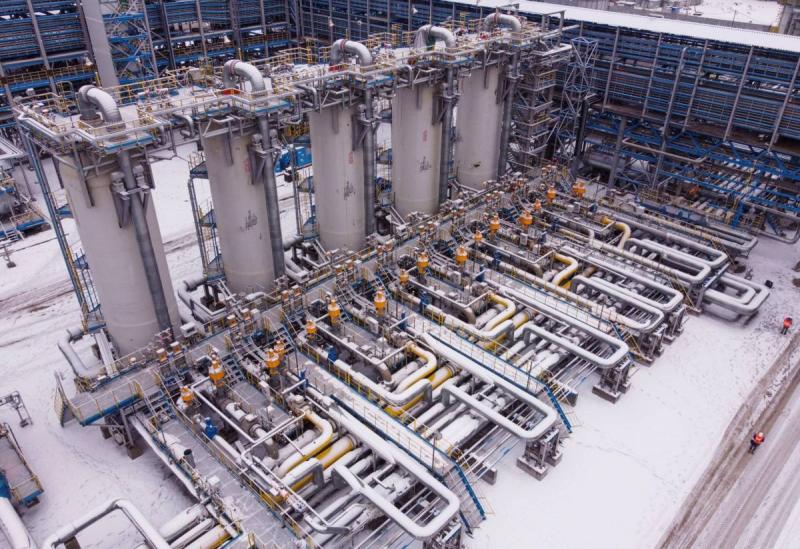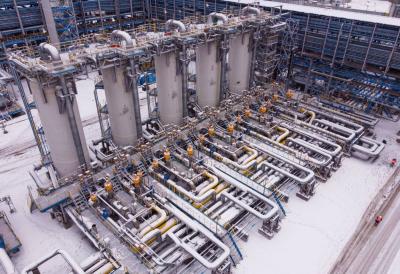The United States and Germany are nearing an agreement regarding the "Nord Stream 2" pipeline that threatens to impose sanctions and retaliatory actions against Russia if it uses energy as a weapon against Ukraine, according to a draft agreement obtained by Bloomberg News. Under the agreement, Germany commits to taking unspecified sovereign action against Russia should any such measures occur, which represents a concession from Chancellor Angela Merkel, who previously refrained from taking any unilateral steps against the Kremlin regarding the gas pipeline that will extend from Russia to Germany.
**Potential Sanctions Against Russia**
The agreement states that Germany will take unilateral action alongside efforts for European action that could include sanctions to limit Russian energy exports in the event that it attempts to use energy as a weapon or commits aggression against Ukraine. A senior U.S. official, who requested anonymity while discussing the agreement's terms, stated that the ambiguity of the agreement's wording is intentional to avoid giving Russia a roadmap to define its response in a misleading way. The official did not rule out that such an action might include limiting gas flows from Russia to Germany.
Despite the agreement indicating a possibility of imposing restrictions on Russian gas flows, its phrasing disappoints many U.S. lawmakers who have criticized the Biden administration for not doing enough to stop the pipeline, which was over 90% completed when President Joe Biden took office.
**German Concession**
The Americans sought to frame the agreement in a way that would necessitate Germany to halt gas flow through "Nord Stream 2" if Russia exerts unlawful influence over Ukraine. However, Germany has long resisted such a step, stating that such threats would only politicize the project, which Merkel insists on treating purely as an economic issue. Opponents of the pipeline claim it grants significant leverage to Moscow over European national security.
The Biden administration initially attempted to halt the project but later changed its approach, stating that doing so would be unrealistic and would only escalate tensions with the German government. U.S. Secretary of State Antony Blinken said last month in an interview with the German magazine Der Spiegel, "Can we intervene against a very bad legacy? If the answer is yes, President Biden has long said that the pipeline is a bad idea and is likely to be a tool for Russian economic and strategic coercion, which could be used not only against Ukraine but indeed against all of Europe, considering how much reliance grows on Russian gas."
**Support for Ukraine**
The agreement is expected to be finalized in the coming days before Ukrainian President Volodymyr Zelenskyy's visit to the United States. Derek Chollet, a U.S. State Department advisor, is scheduled to arrive in Ukraine on Tuesday to discuss the pipeline, which has also been opposed by Ukraine, before heading to Poland, which also opposes the project.
Under the draft agreement, the U.S. and Germany seek to encourage investments of up to one billion dollars in what is called a green fund to help Ukraine transition to clean energy sources. The agreement stipulates that Germany will commit an initial investment of 175 million dollars in the fund and will appoint a special envoy with 70 million dollars to support bilateral energy projects with Ukraine. Ultimately, the agreement requires Germany to use its influence to extend Ukraine's gas transit agreement with Russia for up to 10 years after it expires in 2024. Negotiations for this extension are to begin no later than September 1.
**Kremlin's Position**
Kremlin spokesman Dmitry Peskov did not immediately respond to a request for comments on the preliminary agreement between the United States and Germany. The Kremlin has frequently rejected allegations of using energy supplies as a political weapon and defended "Nord Stream 2" as a purely commercial project. Russia stated it is considering using Ukraine to supply gas to Europe after the current transit contract expires, but only if Kyiv offers attractive terms.
This development follows months of negotiations and Merkel's visit to the White House last week. The two presidents announced in a joint press conference their agreement on deterring Russian President Vladimir Putin from misusing the pipeline for political gains, even as their evaluations on the intentions behind the pipeline project differ. Biden stated, "Chancellor Merkel and I completely agree on our conviction that we must not allow Russia to use energy as a weapon to coerce or threaten its neighbors. We will intensify our work should Russia disrespect this right that Ukraine has as a transit country." Merkel commented, "We have a number of executable tools that will often be at the European level and not just the German one. Germany is also in talks with our European friends on this matter."
The Biden administration imposed sanctions on "Nord Stream 2," the Swiss-based parent company constructing the pipeline, earlier this year but subsequently reversed them. U.S. officials stated that lifting sanctions provided them space for diplomatic discussions and continued negotiations with Berlin.




